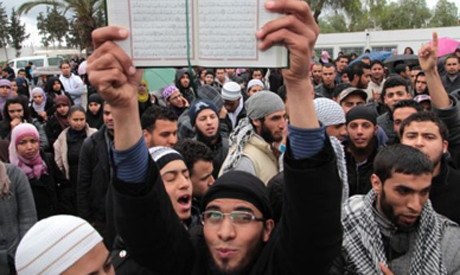
An ultraconservative Muslim demonstrates with a Quran at the Manouba university in Tunis after scuffles erupted between Salafists students and members of a leftist students union, wounding a few students, March 7, (Photo: AP).
President Moncef Marzouki stressed Tunisia does not face the threat of Islamic extremism and is run by a partnership which includes centre-leftist parties, in an interview with AFP.
Marzouki, who on July 17-19 visits France, where he previously lived in exile, said his mission was aimed at erasing tensions that arose during the 2011 revolution that swept away president Zine El Abidine Ben Ali's regime.
The Salafist trend of radical Islam was "a nuisance but not a force capable of endangering the republic," he said.
"When the Salafists wanted to add oil to the fire by pretending religion was being insulted, they had to step back because they realised the whole of the security establishment was absolutely opposed," said Marzouki.
He was referring to an attack on an art exhibition in June that led to riots and a curfew being imposed on the streets. It included a painting of a naked woman with bearded men standing behind her.
Such extremism was the work of "the poorest sector" of society, with "wretched poverty the cause," said the president.
He repeatedly pointed out that the Islamists of Ennahda, which dominates the government, share power with two centre-left parties, the Congress for the Republic (CPR) and Ettakatol, which won 33 percent of the seats in the assembly.
"The claim that Tunisia is governed by Islamists is an aberration ... Tunisia is governed by a coalition ... in which the secular partners have as much weight as their Islamist partner," he insisted.
"Ennahda are people who we somehow 'converted,' in quotation marks, to democracy during the 1980s and 1990s," he said, likening it to Christian Democrats in Europe.
He stressed Ennahda was committed to human rights and the rights of women despite the political crisis sparked by the June extradition of Libya's former premier, Baghdadi al-Mahmudi, over the president's opposition.
"The coalition almost fell apart ... because you must not touch human rights," said Marzouki, adding he had been on the verge of resigning.
But "I received all sorts of assurances from Ennahda and from the prime minister," Hamadi Jebali, the Islamist leader who instigated the extradition, said the president.
He also argued that "never in the history of Tunisia has the press been so free" and full of criticism of the way the country was being run. "I'm even happy when I'm being caricatured because it shows we're no longer in a dictatorship."
Short link: